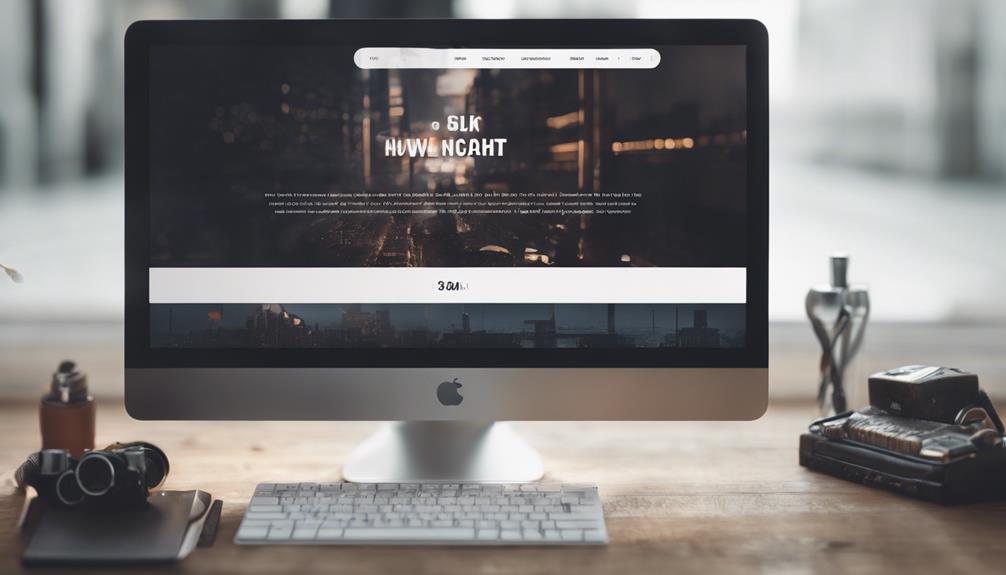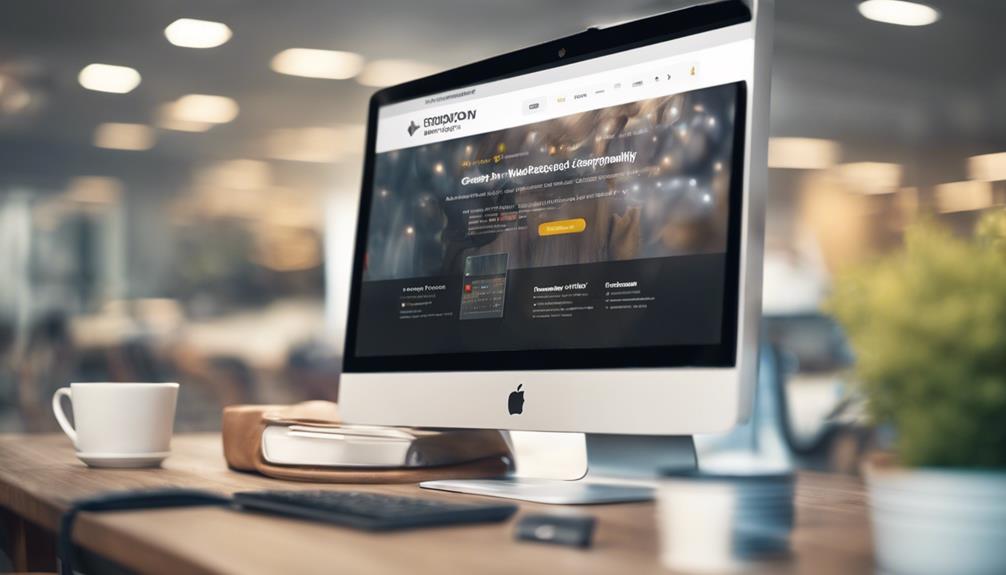When contemplating the development of a website, understanding the various factors influencing the cost is pivotal.
The intricacies of web design costs go beyond mere aesthetic appeal; they encompass the very foundation upon which your online presence stands.
From the complexity of design to the indispensability of responsive interfaces, each element plays a crucial role in determining the financial investment required.
By carefully evaluating these factors, businesses can make informed decisions that not only align with their budget but also propel their digital ventures towards success.
Complexity of Design

When evaluating the complexity of design for a website, it is essential to consider the balance between aesthetics and user experience. Web design companies play a crucial role in achieving this equilibrium by creating visually appealing websites that also offer seamless navigation and functionality. The complexity of design refers to the level of intricacy and sophistication involved in the visual and interactive elements of a website.
Web design companies often face the challenge of meeting the client's expectations for a visually stunning website while ensuring that the user experience remains intuitive and efficient. Balancing these two aspects requires careful planning, collaboration between designers and developers, and a deep understanding of the target audience's preferences and behaviors.
In today's competitive online landscape, websites need to not only look attractive but also provide a user-friendly experience to retain visitors and convert them into customers. By working with experienced web design companies that understand the importance of balancing aesthetics with functionality, businesses can create a website that stands out while delivering an exceptional user experience.
Features and Functionality
Considering the complexity of design and its impact on user experience, the discussion now shifts towards exploring the essential aspects of features and functionality in web design. Features and functionality play a crucial role in determining the effectiveness of a website. When investing in web design and development, businesses must carefully consider the features that will enhance user engagement and drive conversions. For Ecommerceweb design, features like secure payment gateways, intuitive navigation, and mobile responsiveness are vital to ensure a seamless shopping experience for customers.
Working with a reputable web design firm can help businesses incorporate advanced functionalities such as personalized recommendations, social media integration, and dynamic content updates. These features not only improve user experience but also contribute to the overall success of the website. Additionally, functionalities like search engine optimization (SEO) tools and analytics integration are essential for monitoring performance and making data-driven decisions. By prioritizing features and functionalities that align with business goals, companies can create a competitive online presence that resonates with their target audience.
Customization Needs

Customization requirements are a key aspect to address before investing in web design, as tailoring the website to specific business needs can significantly impact its performance and user engagement. Opting for custom web design allows businesses to create a unique online presence that aligns perfectly with their branding and objectives. Bespoke web design offers the flexibility to cater to specific functionalities and design elements that off-the-shelf templates may not provide.
When considering customization needs, partnering with a reputable web design agency is crucial. A web design agency specializing in bespoke solutions can work closely with the business to understand its requirements and translate them into a tailored website design. By collaborating with experts in custom web design, businesses can ensure that their online platform stands out amidst competition and effectively communicates their brand message to target audiences.
Investing in customization through a web design agency may involve higher upfront costs but can yield long-term benefits in terms of improved user experience, higher conversion rates, and better brand recognition.
Content Management System (CMS)
Addressing the infrastructure that supports website customization, the Content Management System (CMS) plays a crucial role in managing and updating website content efficiently. A CMS is a web design software that adheres to essential web design principles by allowing users to create, edit, organize, and publish digital content seamlessly. It simplifies the process of content creation and modification, enabling individuals with varying technical expertise to maintain a dynamic online presence. CMS platforms offer a user-friendly interface, making it convenient to update text, images, videos, and other media without extensive coding knowledge.
Selecting the right CMS is critical as it directly impacts the website's functionality, user experience, and overall success. Factors to consider when evaluating CMS options include scalability, customization capabilities, security features, and integration with other tools. By aligning the chosen CMS with the specific needs and objectives of the website, businesses can streamline content management processes, enhance productivity, and deliver a compelling online experience to their audience.
Responsive Design

Responsive design is a crucial aspect of modern web development, ensuring websites adapt seamlessly to different devices and screen sizes. In today's digital landscape, where users access websites from various devices such as smartphones, tablets, and desktops, responsive web design has become essential. Web design firms prioritize responsive design to create websites that provide optimal user experience regardless of the device being used. This approach not only enhances user satisfaction but also contributes to better search engine rankings, as search engines like Google favor mobile-friendly websites.
Mobile web design is a key component of responsive design, focusing on creating websites specifically tailored for mobile devices. With the increasing use of smartphones for browsing, having a mobile-responsive website is imperative for businesses to reach their target audience effectively. Web design firms that specialize in responsive design ensure that websites are visually appealing and functional across all devices, helping businesses establish a strong online presence. By investing in responsive web design, businesses can stay ahead in the competitive online market and attract more visitors to their websites.
Maintenance and Updates
Regular maintenance and timely updates are critical components of ensuring the longevity and functionality of a website. In the realm of web design and development, overlooking the importance of ongoing maintenance can lead to security vulnerabilities, decreased performance, and potential loss of visitors. Websites require regular updates not only to stay visually appealing and user-friendly but also to incorporate the latest technological advancements and security patches. Neglecting updates can result in compatibility issues with new browsers or devices, hindering user experience and potentially damaging the brand's reputation.
Maintenance tasks may include monitoring website performance, updating software and plugins, optimizing for speed, and backing up data to prevent loss. By investing in regular maintenance, businesses can avoid costly redesigns in the future and ensure that their website remains a valuable asset. Additionally, staying proactive with updates demonstrates a commitment to providing a seamless user experience and fostering trust with visitors. It is crucial for businesses to budget for ongoing maintenance and updates as part of their overall web design strategy to maximize the benefits of their online presence.
Frequently Asked Questions
How Can Web Design Cost Impact My Overall Marketing Strategy and Roi?
Web design cost can significantly impact overall marketing strategy and ROI. A well-designed website enhances user experience, boosts SEO rankings, and increases conversions. Investing wisely in web design ensures a strong online presence, leading to better marketing outcomes.
Are There Any Hidden Costs or Additional Fees I Should Be Aware of When Investing in Web Design?
When investing in web design, it's crucial to be aware of potential hidden costs or additional fees that may arise. Factors like ongoing maintenance, domain registration, and premium plugins can impact the overall investment.
Will the Web Design Process Affect My Current Website Traffic and SEO Rankings?
The web design process can impact current website traffic and SEO rankings. Proper planning, content optimization, and technical considerations during the redesign can help maintain or improve traffic and SEO performance post-launch.
How Important Is User Experience in Relation to the Cost of Web Design?
User experience is paramount in web design as it directly impacts customer satisfaction, retention, and conversion rates. Prioritizing user experience can lead to better engagement and ultimately higher ROI, justifying the investment in quality design.
Can You Provide Examples of Successful Websites Within My Industry to Help Me Understand the Potential Return on Investment for Web Design Services?
Examining successful websites in your industry is paramount to grasping potential ROI from web design services. Studying how these sites effectively engage users, convert leads, and enhance brand perception can illuminate the value of investing in quality web design.

